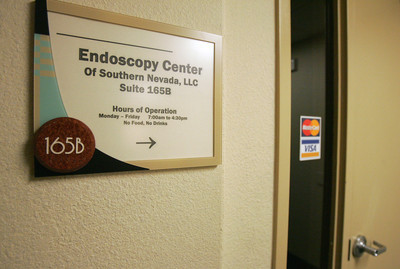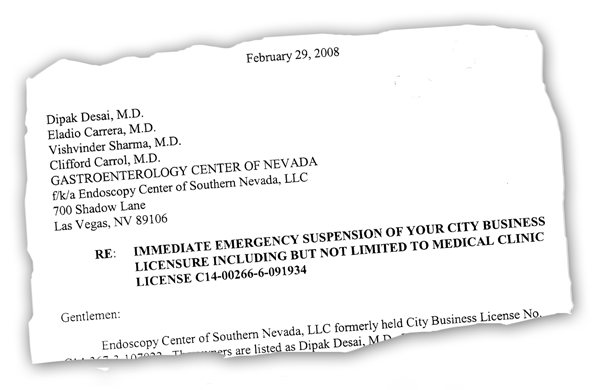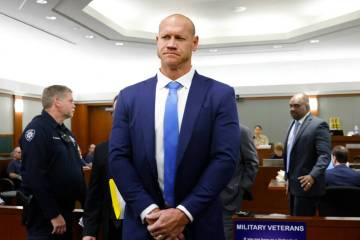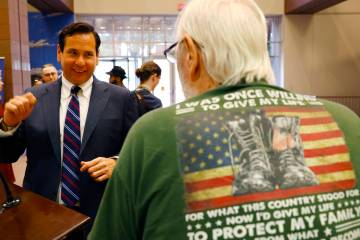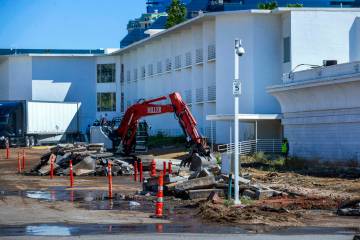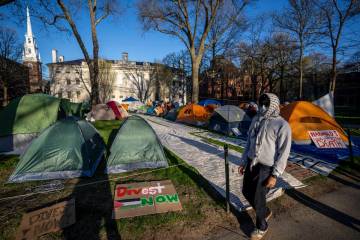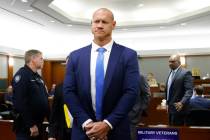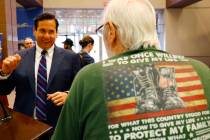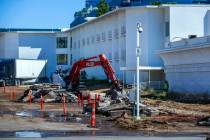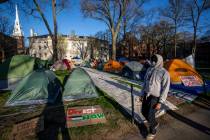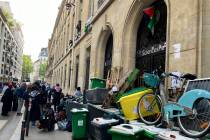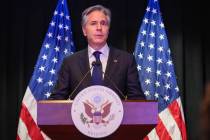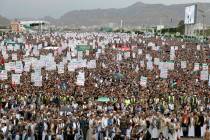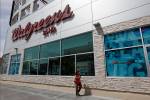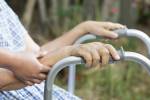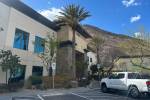Endoscopy clinic shut down
The city of Las Vegas shut down an embattled endoscopy clinic Friday afternoon, two days after an announcement that 40,000 patients could have been exposed to incurable and potentially deadly diseases because of the center's medical practices.
City inspectors entered the Endoscopy Center of Southern Nevada at 700 Shadow Lane about 3 p.m. to serve an emergency suspension order. After waiting until six patients had completed treatment, all employees left the building and the doors were locked.
The clinic's business license is suspended until further notice, Mayor Oscar Goodman said at a late afternoon news conference.
"The city now has the business license in hand," Goodman said. "They don't have a license to do business in the city of Las Vegas."
The four doctors who are named on the license can appeal the decision to city staff and, ultimately, to District Court.
The city also can start the process of revoking the business license outright.
"We'll see what happens," Goodman said. "They might not ask for a hearing. We may just keep the license in our possession indefinitely.
"As long as it's closed -- that's what the purpose of this action was."
Nancy Katz, a spokeswoman for R&R Partners, the public relations firm representing the Endoscopy Center, said she could not comment on the closure "on the advice of legal counsel."
On Wednesday, health officials said 40,000 people who were treated at the clinic from March 2004 to Jan. 11 of this year should be tested for hepatitis B, hepatitis C and HIV, the virus that causes AIDS.
According to investigators, clinic staff regularly reused syringes and vials of medication on multiple patients, a practice that risked spreading communicable diseases. Six people who were treated at the clinic -- five on the same day -- have been diagnosed with hepatitis C.
Practices have been changed at the clinic, but a sharply worded letter from the city's head licensing officer said that's not good enough.
Clinic staff told health investigators that "they knew this technique fell well below accepted medical practice and was dangerous," wrote Jim DiFiore, the city's business services manager. "They were ordered by administrators ... to engage in this practice in order to save money."
He added that some nurses and nurse anesthetists followed orders by administrators, principally Dr. Dipak Desai, that put patients at risk. But others refused "because they were unwilling to risk subjecting patients to life threatening diseases."
"The fact that, once caught, you agreed not to engage in a technique well known to the medical community to subject patients to death or serious illness ... does not persuade me that you won't do it again," DiFiore wrote.
Although the city's action Friday may ease the minds of some, information provided by the Southern Nevada Health District probably will not.
Brian Labus, the health district's senior epidemiologist, acknowledged that the March 2004 date used as a baseline for notification of those who may have been exposed to HIV and hepatitis strains B and C at the Endoscopy Center could be off the mark.
Even more people could have been exposed to blood-borne diseases while under- going colonoscopies and other procedures, he disclosed.
"It is possible that more people are affected," Labus said. "We can't say what did or did not occur earlier at businesses run there."
According to records on file with the city's business license division, the same principals -- Drs. Desai, Vishvindi Sharma, Eladio Carrera and Clifford Carrol -- have run endoscopy centers at 700 Shadow Lane since 2000 licensed under the names Endoscopy Center of Nevada Ltd. and Endoscopy Center of Southern Nevada.
The Shadow Lane Endoscopy Center operates under the umbrella of the Gastroenterology Center of Nevada, which has several clinics across the valley. Patients see physicians at the gastroenterology centers, and the tests are done at the endoscopy centers.
Labus said investigators had access only to personnel and logs that were on hand at the facility since it was remodeled and expanded in March 2004.
"We also were able to observe what was going on, what their practices have been since 2004," he said. "They (staff) told us that what we saw was common practice since then."
Before 2004, many different people worked at the clinic, Labus said. "I don't know whether the center operated in the same way in the past as it did recently or not."
Even if clinic staffers reported the procedures were the same prior to March 2004, Labus said, officials would not have been able to sufficiently document that.
"We needed more hard evidence," he said.
What Labus and investigators learned through recently observing center staff work was that syringes -- not needles -- and the use of vials of anesthesia medication on multiple patients were potential sources of infection.
A syringe would become contaminated by the backflow of blood when patients with a blood-borne disease were injected with medication, health officials said. That syringe, in turn, would be reused to withdraw medication from a different vial. That vial could become contaminated and result in infection.
By Jan. 12, Labus said, the clinic changed its procedures in line with the accepted standard of care.
Labus said patients who are fearful of having been exposed to disease at the center before 2004 should contact their primary care physicians.
Labus said the health district still thinks the March 2004 baseline date is best. "We know what happened since then," he said.
Lisa Jones, chief of the state's Bureau of Licensure and Certification, said Friday that investigators have determined that deficiencies at an affiliated facility -- Desert Shadow Endoscopy Center at 4275 Burnham Ave. -- do not warrant notifications to former patients.
The Burnham facility incorrectly allowed multiple use of drug vials. However, staff did not reuse syringes, Jones said.
"There's no clear evidence of contamination," she said.
She said she expects the Burnham facility to have the problem corrected by Monday.
The city scheduled appeal hearings at 1:30 p.m. Monday and Tuesday.
Contact reporter Alan Choate at achoate@reviewjournal.com or (702) 229-6435. Contact reporter Paul Harasim at pharasim@reviewjournal.com or (702) 387-2908.
CONTACT US If you have information regarding this story, send general tips to us. Contact a reporter: • Annette Wells • Paul Harasim




